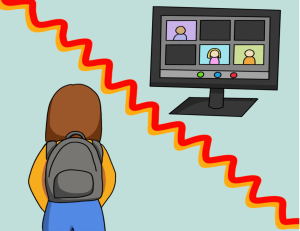Remote learning should remain in the past
February 2, 2022
Despite the recent uptick in COVID-19 cases, Algonquin administrators have decided to keep school open for in-person learning. While some may disagree, this is the best option.
Although beneficial against the spread of germs, remote learning can be detrimental in many ways. For one, the actual learning time is reduced. During remote learning in the 2020-2021 school year, many teachers opted for asynchronous work. Despite working for some, many individuals struggled with this forced independence. Those who lacked good study skills found that learning at home is riddled with distractions that encourage procrastination. As a result, many students fell behind in their classes.
Additionally, cheating became exponentially easier during remote learning. While there are some measures teachers can take to prevent this, such as requiring that Zoom cameras be on and monitoring when test-takers leave tabs, many students have found ways around this. Cheating not only harms students’ short-term learning but can also help develop hard-to-erase habits that can be harmful later on.
Unrelated to schoolwork itself, many students might find themselves in worse mental states. According to the American Psychological Association, academic and social development are likely to slip during online learning for many students, where there is less opportunity for interaction and collaboration. A significant con of remote learning is that students miss out on the chance to engage with one another and their teachers in person, an often-overlooked benefit of in-person instruction.
Furthermore, not all students live in supportive (or safe) households and may view school as an escape from their home environment. They should not be obligated to remain in that space and demonstrate their learning at the same time. Some individuals also do not have access to homes with functioning internet. And while the school can offer devices to use at home, they don’t offer anything to help with WiFi.
It is understandable that students and families are worried about COVID-19, especially with the new variant Omicron. However, the implementation of remote school is a step in the wrong direction. It isn’t just as simple as going online for a few weeks. If implemented, we would most likely have to endure what we did last year: fully remote, hybrid, and then finally back in person. I can’t speak for everyone, but that experience wasn’t the least bit enjoyable.
During these difficult times, administrators are trying their best to accommodate and address all concerns that students and their families may have. However, it is just simply not beneficial at the moment to switch to a remote-learning model, no matter how questionable and uncertain the current COVID-19 situation may be. Instead of going remote, students should take the proper precautions at school: wearing their masks correctly, remaining six feet apart whenever possible and getting the vaccine/booster if eligible.









